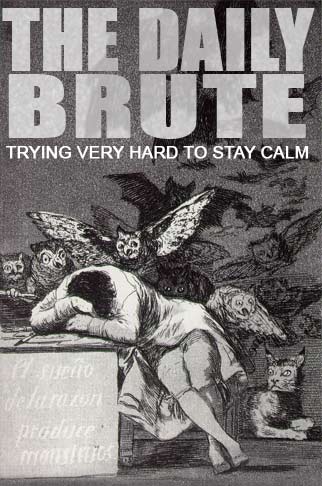
It is a wonder that the Bottler can seriously believe anyone is taken in by his self-serving championship of Britishness.
Today, the Telegraph, continuing its apparent new role as official mouthpiece of the Labour government, carries a nauseatingly insincere article by him in which, pausing only to wipe away a manly tear as he contemplates 'three momentuous centuries of British history', he ringingly declares his passionate attachment not just to the very idea of Britishness but affirms its central role in the national curriculum. He also asserts how 'excited' he is by proposals for a National Museum of British History and, depressingly, that he wants to establish an Institute of Britishness.
Is this the same Bottler who was one of the key architects of Scottish devolution, a move no less transparently designed to perpetuate Labour's political stranglehold north of the border (and note please that, as with so many of the great strategist's fiendishly brilliant plans, it didn't work)? Well, yes, it is.
So here are three points worth stressing.
One, his Institute of Britishness. Its purpose would be, 'so that we can discuss, debate and celebrate the ideas and the writings that have made Britain the great country it is.'
It may genuinely come as news to the Bottler but, do you know what? You don't need an Institute to be able to do this. Anyone at any time can already 'discuss, debate and celebrate' Britain – or indeed denigrate it if they want – in any way they choose. And funnily enough, lots of people already do, including, as the more observant will have spotted, the Bottler himself.
Put it another way, not only would such an Institute be wholly redundant, any organisation established in pursuit of a purely party political objective would be self-evidently suspect. Jolly nice of course for those appointed to run it (I assume at public expense). But otherwise little more than a front for the Labour party.
Two, the National Museum of British History. Whether housed in a purpose-built building or an existing one, it would, in the truest traditions of all public works in modern Britain, open years behind schedule and miles over budget (for a direct comparison, consider the shambles of the British Library); b) bearing in mind the half-witted tosh that was heaped in a panic into the Millennium Dome – intended of course to celebrate Britain as a 'young country' rather than its past but nonetheless the product of no less politically driven a goal – it is more than merely probable that any such collection would be a similarly incoherent muddle.
Perhaps without quite meaning to, the Bottler rather gives the game away anyway, commenting that, 'Our cities already hold the greatest collection of national museums and galleries in the world'. The French and Italians may take issue with this but clearly Britain, London in particular, does have a series of outstanding museums: the Natural History Museum, the Science Museum, the V&A, the National Gallery, the Tate Gallery, the National Maritime Museum and the British Museum to name only the biggest and the best – and yes, it may be worth pointing out that there is already a British Museum and indeed has been since 1759.
But to create a new National Museum of British History would, I presume, meaning raiding these existing collections and, no doubt, others across the country, with the result that they were accordingly weakened. These are organisations whose worth is undoubted, testament to the foresight, energy and imagination of our 18th- and 19th-century forebears. The Bottler proposes in effect to undermine them in order to erect a monument to himself. On the whole, I'd be inclined to leave them be, Gordo. They work.
Three, not the least repellent aspect of Gordo's article is his attempt to portray himself almost literally as father of the nation. His penchant for photo opportunities in schools, for example, is rapidly becoming a leitmotif of his sorry premiership. Thus, today, he emotes moistly about the 'fascinated faces of children looking around the building [Downing Street] for the first time'. Ditto, 'the same bright, fascinated faces [of] young people walking around the Houses of Parliament or visiting the Cabinet War Rooms.'
He then asserts that he is, 'clear that Britain's story ought to be at the heart of history in schools'.
Yes, it should be. Leave aside the fact that he and his party have already had over 10 years to make this the case; leave aside, too, that Britain's state schools have inexorably declined over the same period. If he is serious about really making history, specifically British history, 'central to the modern curriculum', then only the more obviously deluded and deranged would oppose him.
But you know it is all just so much noise, just words, platitudes. It will never happen.


2 comments:
"National Museum of British History"
No Brute, you entirely misunderstand.
It's purpose is to ensure that Islam is included, and seen as having had a crucial role in the development of Britain, thus legitimising the planned future Islamic takeover.
You'll see.
Godo point on devolution having backfired. That is why, for the first time in ages, it is acceptable to discuss (getting rid of) the "Barnett Formula" again.
Which wasn't a formula at all, it was a straight bung to smoothe over a Cabinet dispute, as Lord Barnett has said dozens of times.
Post a Comment